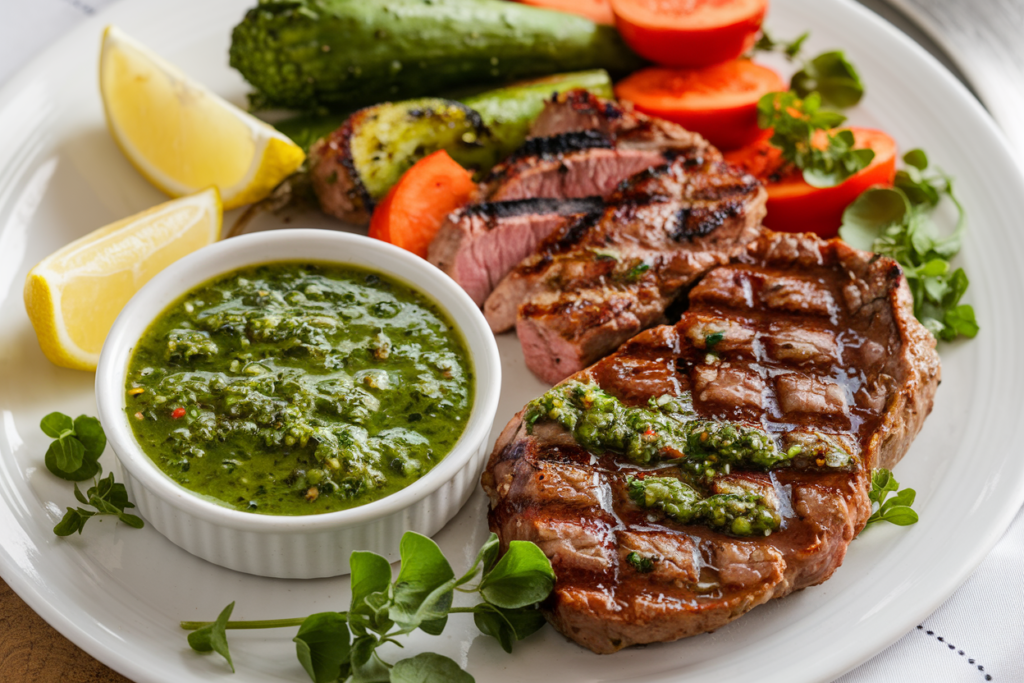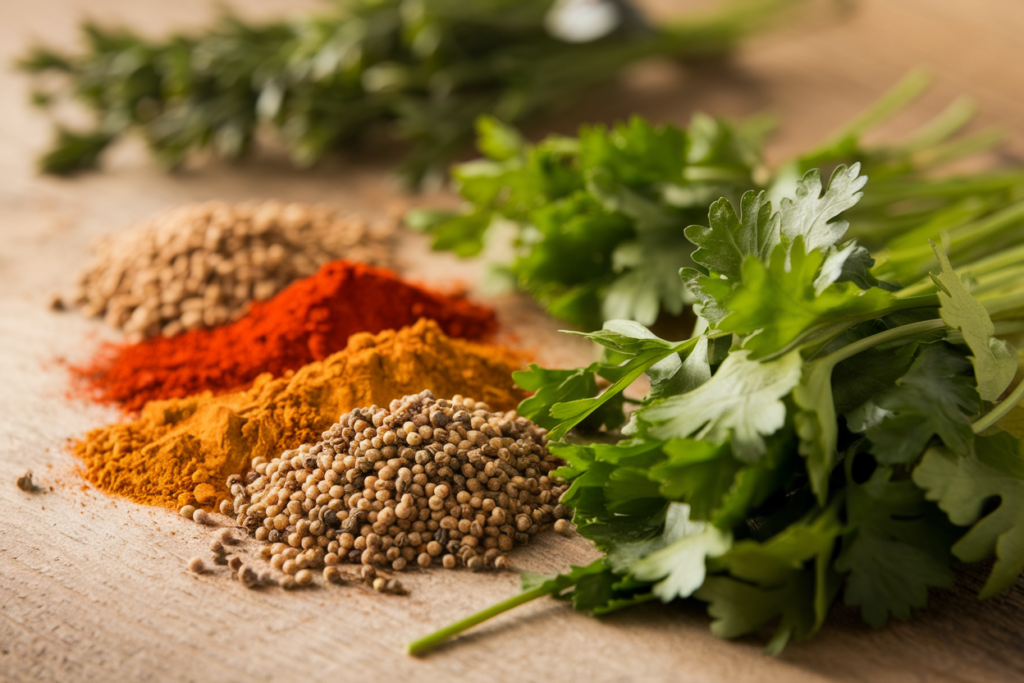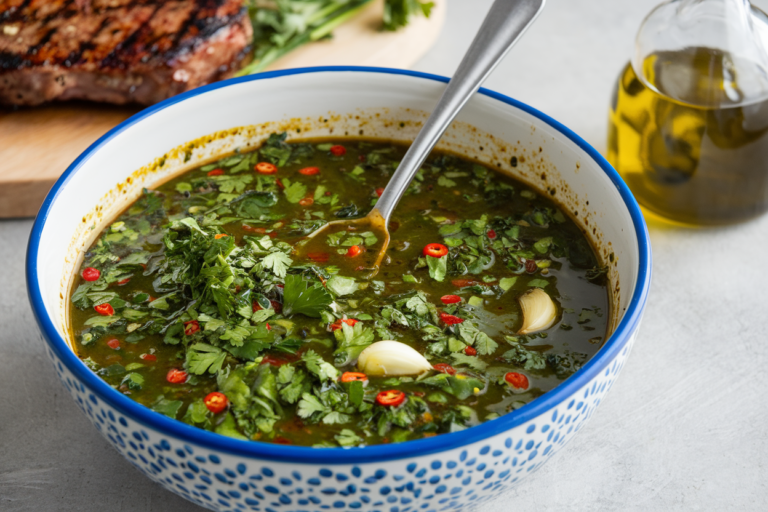Chimichurri is a versatile and flavorful sauce that has its roots in Argentine cuisine, celebrated for its fresh and vibrant taste. If you’ve ever wondered, “How do you get the bitterness out of chimichurri?”, you’re not alone. This question is crucial for anyone looking to perfect this zesty sauce, as achieving the right balance of flavors is essential to enhance its overall taste. In this guide, we’ll explore effective techniques to reduce bitterness and make your chimichurri shine with a harmonious blend of fresh herbs and spices. For related techniques, check out our guide to making Chimichurri with Tomato Halves.
For more on balancing flavors, check out Techniques for Balancing Bitterness in Chimichurri.
One key aspect to consider is the role of each ingredient in contributing to bitterness. The combination of garlic, parsley, and cilantro, along with the type of olive oil used, can significantly impact the final taste. Oxidation and overprocessing can also enhance bitterness, making it crucial to understand how each factor affects your sauce. For more on ingredient impact and techniques, see our Avocado Toast Guide . To better understand how to store your chimichurri to maintain optimal flavor, visit Best Practices for Storing Chimichurri.
What Causes Bitterness in Chimichurri?
Several factors can contribute to bitterness in chimichurri, each stemming from the ingredients used and the methods of preparation. Understanding these factors can help you make adjustments to achieve a more balanced and pleasant flavor.
Ingredient Quality and Processing
Garlic: Garlic is a crucial component of chimichurri, providing its characteristic pungency and depth. However, garlic can turn bitter if not handled properly. When garlic is chopped too coarsely or left in its raw state for too long, it can release compounds like allicin that contribute to a harsh, acrid taste. This bitterness is particularly pronounced if garlic is overprocessed or if old garlic with a more intense flavor is used. To mitigate this, garlic should be finely minced or crushed and ideally allowed to sit for a short period before mixing with other ingredients to mellow its flavor. Roasting garlic can also reduce bitterness, adding a sweet, mellow note to your chimichurri.
Parsley and Cilantro: These herbs are essential for the freshness and vibrancy of chimichurri. However, when used in excess or not balanced properly, they can contribute to a bitter taste. Parsley, in particular, contains compounds that can become bitter if the leaves are overprocessed. Similarly, cilantro can develop a soapy or bitter taste if not used fresh or if the stems are included in large quantities. To avoid this, ensure that herbs are chopped finely but not overprocessed. Use the tender leaves and avoid the stems or older, tougher leaves that may impart bitterness.
Olive Oil Quality
Type of Olive Oil: The type of olive oil used in chimichurri significantly impacts its flavor profile. High-quality, extra-virgin olive oil typically has a fruity, smooth flavor that complements the herbs and other ingredients. However, lower-quality or rancid olive oil can introduce a pronounced bitterness. Rancid oils, which result from oxidation, can impart an off-putting flavor that overwhelms the other components of the chimichurri. To ensure the best flavor, use fresh, high-quality olive oil and store it properly in a cool, dark place.
Oxidation and Rancidity: Olive oil can become bitter over time due to oxidation, especially if it is stored improperly or past its shelf life. This bitterness can also come from olive oils that are too old or have been exposed to light and heat. Regularly check the freshness of your olive oil and choose brands known for their quality and freshness. For more guidance on selecting and storing olive oil, refer to Choosing the Right Olive Oil for Chimichurri.
Balance and Preparation
Overprocessing: The method of preparation can also influence the bitterness of chimichurri. Overprocessing the ingredients in a food processor can release bitter compounds from the herbs and garlic, leading to an imbalanced sauce. To avoid this, pulse the ingredients gently and taste frequently to ensure the right consistency without overprocessing.
Acidity and Salt Balance: The acidity from vinegar or citrus and the salt content are crucial in balancing the flavors of chimichurri. If the acidity is too high or too low, or if the salt is not adequately adjusted, it can affect the perception of bitterness. Adding a small amount of sugar or adjusting the vinegar levels can help to balance out the bitterness and enhance the overall flavor. Experimenting with different ratios of vinegar to oil and adjusting seasoning as needed can help achieve a well-rounded chimichurri.
Practical Tips
- Use Fresh Ingredients: Always use fresh garlic, herbs, and olive oil for the best flavor.
- Avoid Overprocessing: Mince ingredients finely but avoid overprocessing to prevent bitterness.
- Check Oil Freshness: Use high-quality, fresh olive oil and store it properly to avoid rancidity.
- Balance Flavors: Adjust acidity and seasoning to complement the herbs and reduce bitterness.
By understanding and managing these factors, you can create a chimichurri that is flavorful, balanced, and free from unwanted bitterness. Experimenting with ingredient ratios and preparation methods will help you perfect your recipe and enhance the overall dining experience.
The Importance of Balancing Flavors

Balancing flavors in chimichurri is not just about reducing bitterness but also about achieving a harmonious blend of sweet, sour, and savory notes. A well-balanced chimichurri should have a pleasing equilibrium where no single flavor dominates. For example, the tanginess from vinegar or lemon juice should complement the herbaceous notes of parsley and cilantro, while a touch of sweetness can counteract any bitterness.
A balanced chimichurri enhances the overall dining experience, making it a versatile addition to various dishes. Whether you’re serving it with grilled meats or as a marinade, the right balance of flavors ensures that the chimichurri adds depth without overshadowing the main ingredients.
Using Sweeteners to Counteract Bitterness
Adding a touch of sweetness can be an effective way to counteract bitterness in chimichurri. Natural sweeteners such as honey, sugar, or fruit juices can help balance out the bitter flavors. When incorporating sweeteners, it’s essential to do so gradually, tasting as you go to avoid overpowering the other flavors.
Different sweeteners can have varying impacts on the overall flavor profile of chimichurri. For instance, honey adds a rich, floral sweetness, while fruit juices like orange or apple can provide a lighter, fresher sweetness. Experimenting with different sweeteners allows you to find the right balance that suits your taste preferences.
Adjusting the Acidic Component
Acidity plays a crucial role in balancing flavors and reducing bitterness in chimichurri. Vinegar and citrus juice are common acidic components that can help neutralize bitterness. By adjusting the level of acidity, you can achieve a more harmonious flavor profile.
Different types of vinegar can also affect the bitterness level. For instance, apple cider vinegar offers a milder acidity compared to white wine vinegar. Similarly, citrus juices like lemon or lime can provide a fresh, tangy note that complements the herbs and counteracts any bitterness. Experimenting with different acidic components can help you find the right balance for your chimichurri.
Selecting the Right Herbs and Spices

Using fresh herbs and high-quality spices is essential for creating a flavorful chimichurri. Fresh parsley and cilantro are key herbs that contribute to the vibrant taste of the sauce. However, these herbs can also become bitter if not used properly. Ensuring that the herbs are fresh and finely chopped helps prevent bitterness.
In addition to herbs, spices can enhance the flavor and mask bitterness. Spices like cumin and paprika can add complexity and depth to your chimichurri. These spices should be used in moderation to avoid overpowering the sauce. Experimenting with different herbs and spices allows you to customize your chimichurri to suit your taste preferences.
Oil Quality and Its Impact on Bitterness
The quality of olive oil used in chimichurri can significantly affect its flavor. High-quality olive oil adds a smooth, fruity note, while lower-quality or rancid oils can impart a bitter taste. Choosing a fresh, high-quality olive oil is crucial for achieving a well-balanced chimichurri.
To prevent bitterness from rancid oil, store olive oil in a cool, dark place and use it within its recommended shelf life. If you notice any off-flavors or a rancid smell, it’s best to discard the oil and use a fresh bottle. For tips on selecting and storing olive oil, see Choosing the Right Olive Oil for Chimichurri.
Proper Mixing and Preparation Techniques
Proper mixing and preparation techniques are essential for creating a well-balanced chimichurri. Overprocessing the ingredients can lead to a bitter taste, so it’s important to blend them just enough to achieve the desired consistency without releasing excessive bitter compounds.
Manual preparation, such as chopping herbs by hand, can be beneficial for maintaining control over the texture and flavor of the chimichurri. While food processors can be convenient, they can also overprocess the ingredients if not used carefully. Experimenting with different preparation methods can help you achieve the perfect balance for your chimichurri.
Incorporating Savory Elements
Adding savory elements to chimichurri can enhance its flavor and reduce bitterness. Ingredients like roasted garlic, shallots, or caramelized onions can add depth and complexity to the sauce. These elements introduce savory umami notes that complement the fresh herbs and counteract any bitterness.
Experimenting with different combinations of sweet and savory elements allows you to customize your chimichurri to suit your taste preferences. For instance, roasted garlic adds a rich, mellow flavor, while caramelized onions provide a sweet, savory note that balances bitterness.
Experimenting with Chimichurri Variations
Exploring different variations of chimichurri can help you find the perfect recipe for your taste preferences. Non-traditional ingredients like mint, basil, or tarragon can add unique flavors and reduce bitterness. Customizing your chimichurri based on personal preferences allows you to create a sauce that perfectly complements your dishes.
Storing and Preserving Chimichurri

Proper storage is crucial for maintaining the flavor balance of chimichurri. Store your chimichurri in an airtight container in the refrigerator to keep it fresh and flavorful. Proper storage helps preserve the quality of the ingredients and prevents the development of off-flavors.
For more information on storing chimichurri, see Irresistible Pistachio Popsicles Recipe and How to Clean and Cut Leeks for Soup.
FAQs
What can I do if my chimichurri is too bitter?
Adjusting the sweetness or acidity can help balance the bitterness. Consider adding a small amount of honey or adjusting the vinegar levels.
Can I omit garlic to reduce bitterness?
Garlic can be reduced or omitted if it’s contributing too much bitterness. Consider using roasted garlic for a milder flavor.
Is it necessary to use fresh herbs?
Fresh herbs are recommended for the best flavor, but dried herbs can be used if fresh ones are not available.
What type of vinegar should I use for chimichurri?
Apple cider vinegar, red wine vinegar, or white wine vinegar are all good options. Choose based on your flavor preference.
How do I know if my olive oil is too bitter?
Taste the oil directly; if it has a sharp, unpleasant bitterness, it may be rancid or of poor quality.
Can I use other oils instead of olive oil?
Yes, alternatives like avocado oil can be used for a different flavor profile.
How long can I store chimichurri in the fridge?
Chimichurri can be stored in the refrigerator for up to two weeks.

